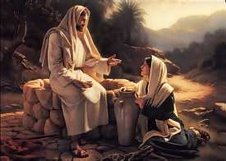At the Passover in the time of Christ, the sacrificial portions of the lambs were presented to the alter. The remaining portions were taken to the houses where no fewer than 10 men and no more than 20 ate one animal. Bitter herbs, unleavened cakes dipped in sweet sauce were also eaten; and four cups of red wine were drunk. After the 1st cup of wine was blessed and passed around to all present and the Hallel (Ps. 113, 114) was sung, the 2nd cup of wine was drunk and the meal eaten. Then came a prayer of thanksgiving. The 3rd cup of wine was blessed; and during the passing of the 4th cup of wine Ps. 115-118 were sung. "In this historic passover Jesus became the bridge by which this solemn feast of his people progressed into the institution of the Lord's Supper and the establishment of the Christian Communion..." "In Paul's theology Christ became our Passover, sacrificed for us. (1Cor. 5:7) He compares the "old leaven" to malice and wickedness, and urges Christians to keep the feast "with the unleavened bread of sincerity and truth." (Harper's Bible Dictionary, Harper & Brothers Publishers, 1961, pg 528)
It was during this event that Jesus used bread as a symbol of his own body. He broke the bread and gave each of his Disciples to "Take and eat; this is my body." (Matt. 26:26). After which Jesus took the fourth cup of red wine during the Passover meal, "Then he took the cup, gave thanks and offered it to them, saying, "Drink from it, all of you. This is my blood of the covenant, which is poured out for many for the forgiveness of sins. I tell you, I will not drink of this fruit of the vine from now on until that day when I drink it anew with you in my Father's kingdom." (Matt. 26:27-29)
"World-wide observance of the service of Christian Communion, which developed from the Lord's Supper, brings all men into the range of inclusion in the living Christ, the body of the living Lord being the mystical body of the Church, where "we, being many, are one bread, and one body: for we are all partakers of that one bread." (1 Cor. 10:17) The Communion service is the cornerstone of the ecumenical (meaning, Christian Churches as a whole) Church." (Harper's Bible Dictionary, Harper & Brothers, Publishers, 1961, pg. 400, parenthesis added)
In my studies I have not found a specific time frame or day that communion is to be observed. I know within the Catholic Church it is practiced often. Their belief in the communion is based on transubstantiation. That is not my focus. The points I'm concerned with are the ways the LDS practices the communion. Those points are as follows:
1. Water is used, not red wine
2. One cannot change something Christ Himself used in the Lord's Supper
3. No power can change Christ's words
4. Communion, or Sacrament, is not a requirement for salvation
WATER IS USED NOT RED WINE
The Church of Jesus Christ of Latter-day Saints uses water instead of wine. Joseph Smith himself was the first person to commence the use of water during communion, or sacrament. The practice of using wine continued for many years in the LDS church, however, the grapes must be raised and cultivated by only the LDS. The practice was completely stopped in the early 1900's when the authorities of the Church decided to put more emphasis on the "Word of Wisdom," plus there were concerns over young men handling the wine before, during, and after the meetings. See D&C 89:6, and D&C 27:4.
ONE CANNOT CHANGE SOMETHING CHRIST HIMSELF USED IN THE LORD'S SUPPER
Jesus Christ took the wine and gave it to his Disciples to drink. He said to drink all of it. Even the Jesus Christ of the Book of Mormon instructed those to drink wine: 3 Nephi 18:1-3, 3 Nephi 18:8-9, 3 Nephi 20:5-9, Moroni 5:1-2, Moroni 6:6. The Doctrine and Covenants tell the LDS to use wine: D&C 20:40, D&C 20:75, D&C 89:5-6.
NO POWER CAN CHANGE CHRISTS' WORDS
The Mormons believe that through the power of the priesthood, God speaks directly to those in authority over their Church. This belief gives an open gate for that 'authority' to change any part of any of their beliefs or any scripture. The wine in communion was not left out. Joseph Smith says that he had a revelation from God, through an angel, to use water.(He let the fear of his enemy get the best of him!) Then, later on, Joseph Smith got another revelation stating that wine is bad. See D&C 27:2-5, D&C 89:5-7. The prophet even goes as far as to say that it doesn't matter what is used for the sacrament, see D&C 27:2. To the LDS, it was the blessing of the "Priesthood" that makes the water, or items special; not the water or items themselves. So..., if the LDS gives the red wine a "priesthood blessing", it will be special, thus their "Word of Wisdom" will not be compromised.
COMMUNION, OR SACRAMENT, IS NOT A REQUIREMENT FOR SALVATION
For the Mormons, the partaking of the sacrament, during the sacrament meeting, is the most holy and sacred act that members are commanded to participate in. If one eats and drinks without being sin free for that week, that person isn't supposed to eat or drink of the sacrament. If they do, the destroying angel will slay them (D&C 89:21), and they will also cause damnation to their soul (3 Nephi 18:28-29). In the Wikipedia, on the web, the sacrament is stated to be "a plea for forgiveness of sins." The LDS doctrine clearly states the opposite.
The practice of Christian Communion is not an ordinance or a commandment, it is the celebration of the Lords Supper which is to lead the faithful to; (1) to remember his personal redemption by the blood of Jesus, (2) to remain grateful for his salvation, (3) and to keep alert for the ultimate coming of universal redemption (Harpers Bible Dictionary, pg 400). The taking of the bread is to represent His flesh, and the wine His blood, for the special purpose of "signifying" that the Christian is living in Christ.
Water is not Wine
Sunday, February 24, 2008











4 comments:
I haven't visited your site in quite a while--it's good to see you're still writing such great posts. In all my studies of Mormonism, I've never looked into their view of Communion, so this is a welcome explanation. I definitely didn't understand the water vs. wine thing. Keep up the good work!
It is so sad to see innocents being led astray by this stuff. Your research is sound, but your conclusions are nothing short of ridiculous. In one section you say that “One cannot change something Christ Himself used in the Lord’s supper,” then in the very next virtual breath you make the ridiculous claim that “Mormons believe that… God… [gives their leaders the] ‘authority’ to change any part of any of their beliefs or scripture.” Not only are both of these statements ridiculous, but they completely contradict each other!
Continuing on, you make the even more ridiculous claim that “If one eats and drinks without being sin free [sic] for the week, that person isn’t supposed to eat or drink of the sacrament.” The Sacrament is a renewal of covenants; if that were the case, it would be completely pointless!
I really don’t want to be mean, here, but seriously…. kristies, please take this stuff with a huge grain of salt. This person is obviously “Mormon no More” because he doesn’t have the slightest clue what real Latter-day Saints believe.
Jeff,
I can appreciate your point of view, yet being in Mormonism for all my life, I can say I know what the LDS church is all about. I was a 5th generation Mormon. I hope you will take an objective view of what you believe. The Mormons do a real good job in twisting things around to obscure the truth.
Thank you for your comment.
handmaiden, I’m glad to hear you are a “5th generation Mormon,” but unfortunately that doesn’t seem to have helped you learn what the Church teaches.
I’m sure some of the stuff you’re talking about is what you genuinely understood from what people taught, but I’ve now read half a dozen of your posts and haven’t seen a single one that doesn’t contain a completely false representation of what the Church of Jesus Christ teaches.
I’ve spent the last 17 years taking an objective view of what I believe: I’ve studied literally hundreds of publications, both for and against the Church. Guess what: I’ve never found a single charge against the Church that wasn’t easily answered. But here’s the even crazier part: ostensibly because they want to maintain the façcade of respectability, even most of the so-called “anti-Mormon” books don’t make such ridiculous claims as some that I’ve seen here!
Seriously, handmaiden, I guess we can at least take comfort in that we agree on one thing: if the Church of Jesus Christ were to teach even half of the things you attribute to it, neither one of us would be an active member! ;-)
Post a Comment